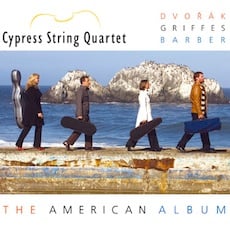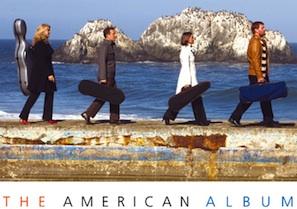
For its newest CD, San Francisco’s Cypress String Quartet has turned to an epoch in which the notion of a genuinely American sensibility in concert music was the subject of much debate and aspiration. The three works on The American Album, released on the quartet’s own label, reveal various approaches to this challenge in successive generations. The program is enlightening as it explores the evolution of American — or, in one case, American-inspired — composition, and the performances are as fine as any you’re likely to hear.
The disc opens with music by a prophet of a distinctly American music, Antonin Dvořák, the Czech visitor who saw in Native American and African-American sources the potential to develop an indigenous American concert music. The Cypress performance of his “American” quartet, Opus 96, is outstanding. The playing from the very beginning is animated and soulful, with all the instruments singing and breathing as Dvořák’s music calls for. The clarity of the quartet’s collective sound produces an expressive transparency, as well, with individual lines each shaped toward a unified interpretation. There is both urgency and lyricism in the opening Allegro ma non troppo and in the later fast movements, and even the most serene moments are animated by a captivating, unbroken musical line.
Listen To The Music
Dvorak String Quartet No. 12, I. Allegro ma non troppoGriffes 2 Sketches, I. Lento e mesto
Purchase Recording

The least known of the works on the disc, Charles Tomlinson Griffes’ Two Sketches Based on Indian Themes, is a lovely discovery. Credit is due to the Cypress players for researching the origins of the 1918–19 work, written shortly before Griffes’ early death. They learned from a Chippewa elder that the source of the opening movement is the “Chippewa Farewell Song,” and that the second is drawn from a Hopi festival. The depth of their commitment to understanding the work is evident throughout, with a haunting take on the opening Lento e mesto movement and a probing, but warm, performance of the following Allegro giocoso.
The program moves on to the music of Samuel Barber, a member of a later generation that began to forge a recognizably American sound without the native references that Dvořák so valued. The players inhabit Barber’s String Quartet in B Minor, Op. 11, as fully as the preceding pieces, finding beauty in both the surges of energy and the hymnlike slower passages in the opening and closing movements. It’s revealing to hear Barber’s Adagio in its less-celebrated role as the middle movement of this piece, before its large-scale arrangement made it famous. The music benefits here from the quartet’s clarity, with no loss of the weightiness of its orchestrated version. I found this beautifully shaped reading even more affecting than most performances of the string orchestra version.
The recording, which was done at Skywalker Sound, is exceptional — warm, clear, and vibrant throughout.

